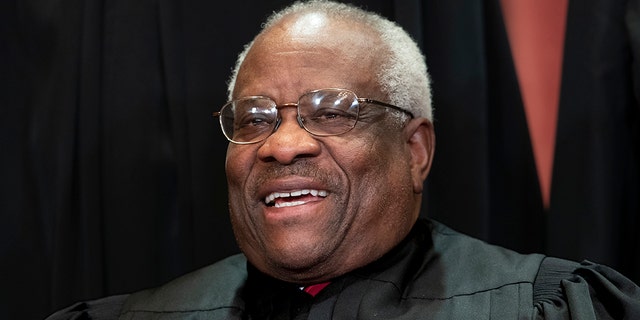No products in the cart.
Supreme Court Justice Clarence Thomas on Monday rebuked the Kansas Supreme Court for allegedly taking the high court’s precedent too far in a ruling that let a man off the hook for telling a police officer’s son that his dad would end up “in a ditch.”
Thomas did so while dissenting from the Supreme Court’s decision not to hear an appeal of that case and one other about a man who told his mother that he was “going to f—— kill [her] a–” after the Kansas Supreme Court ruled that both cases involved speech that was protected under the First Amendment. That ruling overturned the state law the two men were convicted under — which Thomas argued contradicts past rulings and represents an “overreading” of a 2003 Supreme Court case.
In the case at hand, a man named Timothy Boettger was upset one night because someone had shot his daughter’s dog and police were not investigating, according to a petition submitted by Kansas asking the Supreme Court to overrule the state court and reinstate its law. Boettger went to a convenience store, where he knew an employee was the son of a police officer.

Associate Justice Clarence Thomas, appointed by President George H. W. Bush, sits with fellow Supreme Court justices for a group portrait at the Supreme Court Building in Washington, Friday, Nov. 30, 2018. (AP Photo/J. Scott Applewhite)
TRUMP’S STEEL TARIFFS STAND AFTER SUPREME COURT DECLINES CHALLENGE
There, “Boettger told another employee that ‘these people … might find themselves dead in a ditch somewhere,'” before leaving and returning again to confront the officer’s son.
“You’re the man I’m looking for,” Boettger allegedly told the officer’s son while visibly shaking and with clenched fists. He continued to say, according to testimony from the officer’s son, that “he had some friends up in the Paseo area in Kansas City that don’t mess around, and that I was going to end up finding my dad in a ditch.”
Boettger was convicted on one count of “reckless criminal threat” despite denying that he wanted to threaten the officer’s son or the officer. The Kansas Supreme Court later overturned the decision, saying that the law’s provision against threats made “in reckless disregard” was overbroad and did not rise to the “true threat” level often used as the standard in free speech cases. It also said that Boettger’s actions did not rise to the level required to be considered intentional intimidation.
But Thomas on Monday said that the Kansas Supreme Court erred in its ruling.
“In my view, the Constitution likely permits States to criminalize threats even in the absence of any intent to intimidate,” Thomas wrote Monday. “It appears to follow that threats of violence made in reckless disregard of causing fear may be prohibited. The Kansas Supreme Court reached the opposite conclusion by overreading our decision in Black, which did not answer the question presented here.”
The “Black” case Thomas cites is Virginia v. Black, in which the court held in 2003 that a state may ban cross-burning meant to intimidate, but that it could not, in law, assume all cross-burning is meant to intimidate.
CLICK HERE TO GET THE FOX NEWS APP
Thomas also said that Connecticut and Georgia previously ruled that speech like Boettger’s could be punished legally without violating the First Amendment. The justice noted, for example, “[t]he Supreme Court of Connecticut found that ‘nothing in Black itself suggests that the [C]ourt intended to overrule the preexisting consensus among the federal circuit courts of appeals that threatening speech may be punished under the [F]irst [A]mendment when a reasonable person would interpret the speech as a serious threat.’”
There is also a long history, which Thomas outlined in his dissent, of states passing laws banning certain threats early in the republic, indicating that the framers of the Constitution might have been okay with such laws.
Thomas also said that 16 states and Washinton, D.C. are currently facing challenges to laws like Kansas’ and the court should nip this issue in the bud before there are conflicting interpretations of the First Amendment all over the country.
“If state high courts hold even a fraction of these statutes unconstitutional, we will have no choice but to intervene,” Thomas said. “I would do so now to address the problem caused by our language in Black.”


